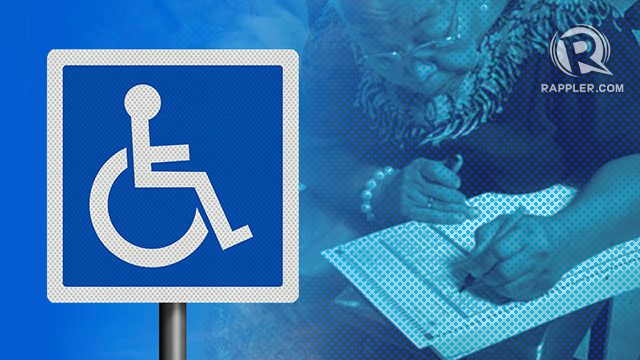SUMMARY
This is AI generated summarization, which may have errors. For context, always refer to the full article.

MANILA, Philippines – Among some 60 million registered voters for the May 13 elections are persons with disabilities (PWDs) and senior citizens.
It’s the Commission on Elections’ (Comelec) duty to ensure that they are able to participate in the electoral process. (READ: PWDs appeal to Comelec for ‘barrier-free’ elections)
Republic Act (RA) 10366 or “An Act Authorizing the Comission on Elections to Establish Precincts Assigned to Accessible Polling Places Exclusively for Persons With Disabilities and Senior Citizens,” signed into law in 2013, was established precisely for this purpose.
According to Comelec, there are 49,395 PWDs and senior citizens registered to vote at accessible polling places (APPs). Only these PWDs and senior citizens will be given access to APPs during the elections in May. So what exactly does the law provide for these voters?
Accessible polling places
An APP is a polling place located on the ground floor, preferably near the entrance, and has no physical barriers. There should be sufficient signage to make APPs easier to identify.
Assistive devices such as headphones for the visually-impaired and wheelchairs for the handicapped should also be available to facilitate easier voting for PWDs and senior citizens.
What about other PWDs and senior citizens who failed to notify the Comelec about their conditions during the voter registration period?
If an APP is not established in the building or voting center, a makeshift or temporary polling place “shall be built inside or in close proximity to the voting center,” as per Comelec Resolution No. 10486. These makeshift polling places must also be near the entrance of medical help desks, if any.
These makeshift polling centers or emergency APPs, as per the Comelec resolution, are supposed to cater to PWDs, senior citizens, and heavily pregnant women who were unable to register to vote in APPs during the voter registration period in 2018.
Assistance
Should the PWD, senior citizen, or illiterate require help filling out the ballot, the following people are allowed to assist them:
- A relative within the 4th degree of consanguinity or affinity
- A person who is of their confidence belonging to the same household
- A member of the Electoral Board (EB) present at the voting center
All of these people must be of voting age to be allowed to assist. The members of the EB to assist these voters are also required to have gone through sensitivity training organized by the National Council on Disability Affairs and the Commission on Human Rights.
In voting centers where voters with visual, speech, and hearing impairment are registered, there should be sign language interpreters or lists of candidates transcribed in Braille.
Theory versus practice
These measures are what RA 10366 and Comelec Resolution No. 10484 seek to provide PWDs, seniors, and even pregnant women. But there is much room for improvement.
In an opinion piece for Rappler, Paula Bianca Lapuz of The Asia Foundation wrote, “The current alternative voting mechanisms offered by the Comelec will mostly only offer ‘physical accessibility.’ This means that these polling places will only be located at the ground floor and be barrier-free at best.”
“So, if you are blind, deaf, and/or with psychosocial disabilities, a safe assessment is that you will have a more challenging experience than other [voters with disabilities] this coming elections,” she also wrote. (READ: The 2016 elections and the road to a PWD-inclusive PH)
She added that the Comelec should take into account not only physicial disabilities but other conditions as well. For this, she suggested that there would be a need for coordination with other government agencies like the Department of Education and the Department of Public Works and Highways on the matter of renovating voting centers.
“Overall, government response to access issues must be holistic and decisive, otherwise the same issues will keep resurfacing every 3 years,” she wrote. – Rappler.com
Add a comment
How does this make you feel?
There are no comments yet. Add your comment to start the conversation.